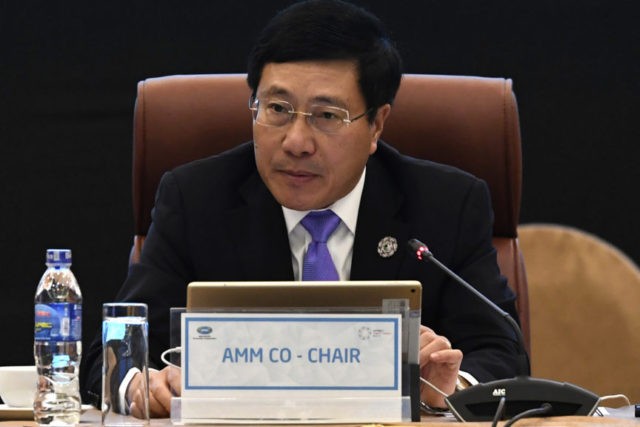Vietnamese Foreign Minister Pham Binh Minh arrived in North Korea on Tuesday for an anticipated three-day visit.
Details of his agenda were not publicized, but it is reasonable to assume he will discuss preparations for the second denuclearization summit between U.S. President Donald Trump and North Korean dictator Kim Jong-un, scheduled to be held in Hanoi on February 27 and 28.
The South China Morning Post took it as a given that Pham, also the deputy prime minister of Vietnam, is in Pyongyang to discuss security arrangements for the Trump-Kim summit. Pham may also have been delegated to reassure the North Koreans of Vietnam’s friendship and discuss their model for transitioning from tight-fisted communism to a more open market economy.
“North Korea is a friend that had helped Vietnam a lot in the past,” former Vietnamese diplomat Nguyen Vinh Quang told the SCMP.
“In recent years, they’ve experienced hardship, being isolated on the international stage. What Vietnam can see ahead is light – meaning North Korea’s situation … can be improved and North Korea can develop,” he said.
The Vietnamese were able to improve their per capita gross domestic product by about 400 percent over the past 30 years and have become one of the fastest-growing economies in the world. Kim Jong-un has publicly expressed admiration for Vietnam’s accomplishments. If his meeting with Trump proceeds as scheduled, he will become the first North Korean leader to visit Vietnam in six decades.
Vietnamese politicians have expressed great enthusiasm for hosting the Trump-Kim summit, as they believe it will raise their regional diplomatic profile and showcase Vietnam’s success to the world.
“This important event has shown that Vietnam’s investment environment is good, that Vietnam’s development model is going in a right direction and especially that the security and safety in Vietnam is wonderful. Vietnam will demonstrate its international role and do its best to let the word ‘Vietnam’ ring out,” Prime Minister Nguyen Xuan Phuc said on Tuesday from the Hanoi Stock Exchange.
American officials have encouraged North Korea to study the Vietnamese model, notably including Secretary of State Mike Pompeo and President Trump himself.
Citing the enormous growth in U.S.-Vietnam trade since relations were normalized in the 1990s, Pompeo in July offered cooperation with Vietnam as proof that “when a country decides to create a brighter future for itself alongside the United States, we follow through on American promises.”
“The miracle could be your miracle,” Pompeo said to the North Koreans.
Foreign policy analysts told Voice of America News on Monday that following the Vietnamese model could be politically palatable to Kim because the Vietnamese Communists are seen as defeating both their domestic adversaries and the United States in the Vietnam War.
Implementation of the Vietnamese plan would be relatively straightforward because North Korea’s economy today strongly resembles the Vietnamese economy three decades ago. Former U.S. intelligence official William Brown, now head of the Northeast Asia Economics and Intelligence Advisory, suggested following Vietnam’s path at first could soon bring North Korea to a point where it embraces the even more productive and liberal South Korean model.
Among the biggest obstacles facing Pyongyang will be its reluctance to privatize land ownership as Vietnam did, and its even greater reluctance to give up on strongman cult-of-personality rule.
“The key aspects of economic development and growth are domestic, not external. It takes hard work, risk-taking, and many decentralizing reforms. Kim needs to understand that,” said Brown.

COMMENTS
Please let us know if you're having issues with commenting.